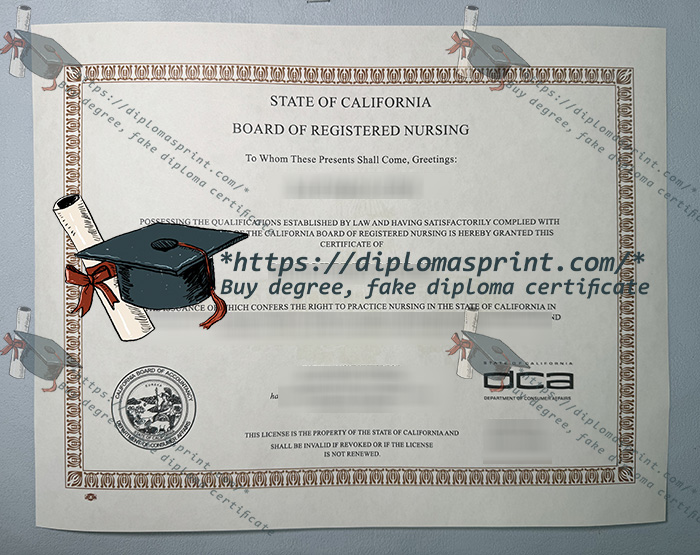
Sell a California BRN Certificate, California Board of Registered Nursing Certificate, Registered Nurse Certificate, A Board of Registered Nursing (BRN) certificate is a credential issued by a state’s Board of Registered Nursing that allows a nurse to legally practice as a Registered Nurse (RN) in that state. In many countries, such as the United States, the BRN certification is a crucial part of the nursing licensure process. Here’s a breakdown of its uses and significance:
1. Legal Requirement for Practice
In most states in the U.S., having a BRN license is a legal requirement to practice as a registered nurse. The certificate ensures that the nurse has met the minimum standards of education, training, and examination necessary to provide safe and effective patient care.
2. Ensures Competence
The certification verifies that a nurse has completed the necessary education (typically a nursing degree or diploma) and passed the NCLEX-RN exam (National Council Licensure Examination for Registered Nurses). This process ensures that the nurse has the necessary knowledge and skills to provide high-quality care. Buy Colorado Registered nurse Certificate.
3. Career Opportunities
Being licensed as an RN opens up various career opportunities in healthcare. It allows individuals to apply for jobs in hospitals, clinics, long-term care facilities, and other healthcare settings. Without the BRN certification, a nurse cannot legally practice in many of these roles.
4. State-Specific Recognition
The BRN certificate is state-specific, meaning it is valid only in the state where it was issued. If an RN wishes to practice in another state, they may need to apply for licensure by endorsement in that state. However, some states participate in the Nurse Licensure Compact (NLC), which allows nurses to practice across multiple states with one license.
5. Professional Credibility
Holding a BRN certificate also enhances a nurse’s professional credibility. It signifies that the nurse has passed rigorous exams and adheres to a high standard of practice. The certificate can be important when seeking employment, promotions, or specialized roles within the healthcare system.
6. Continuing Education and Professional Growth
In many states, to maintain a BRN certificate, nurses are required to complete continuing education and possibly renew their licenses every few years. This ensures that nurses stay current with the latest healthcare practices, technologies, and regulations.
7. Regulatory Oversight
The BRN is responsible for regulating the practice of nursing within its jurisdiction. This means that the board oversees nursing education programs, enforces standards of practice, and investigates complaints or concerns about nurse conduct. Having a BRN certificate means that the nurse is held to these professional standards and subject to the oversight of the board.
8. Specialization Opportunities
With a valid BRN certificate, nurses can also pursue certifications in specialized fields, such as pediatric nursing, geriatrics, critical care, or nurse practitioner roles. These certifications often require additional education and exams but help nurses expand their expertise and improve career prospects.
9. Public Trust and Patient Safety
The BRN certification helps protect the public by ensuring that only qualified individuals are providing direct patient care. Nurses are often in positions of significant responsibility, and the certification helps build public trust in the healthcare system by ensuring that nurses meet established standards of education, ethics, and practice.
10. Advocacy for Nurses
State Boards of Nursing, through their certification process, can also advocate for better working conditions, fair wages, and other rights for nurses. They often work alongside professional associations to support the nursing workforce.
In summary, the Board of Registered Nursing certificate serves as both a legal credential and a mark of professional competence that allows nurses to practice safely, access a variety of career opportunities, and uphold patient safety standards within the healthcare system.












